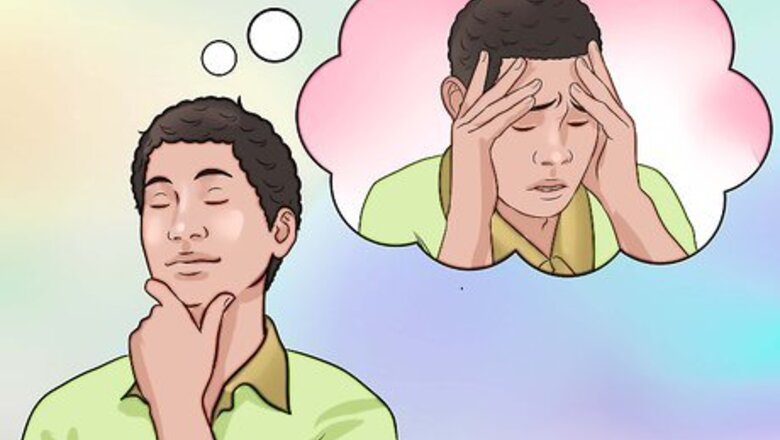
views
Reducing Loneliness
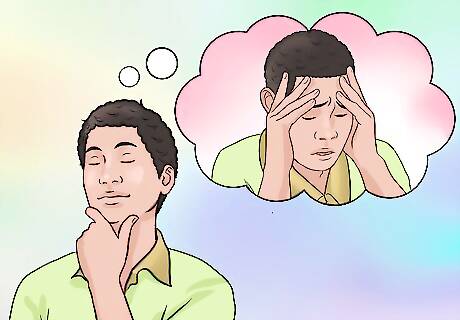
Change the way you think about being alone. Your thoughts can change your feelings (loneliness, depression) and behaviors (how well we cope). If you think negatively about being alone, you will most likely have negative feelings about it. However, if you embrace being alone you may be able to better cope with it and reduce your loneliness overall. Use positive self-talk. For example, tell yourself that being alone can be a good thing. Tell yourself, "It's okay to be alone. I like my own company." This can help you build up your tolerance to being alone. When you find yourself thinking negatively about being alone such as, "I hate being alone. I'm so lonely. This is terrible," think of some alternative thoughts that might be more realistic and helpful. For example, you could think or tell yourself, "I can deal with being alone. I feel lonely but I know I can cope with it. It's not so bad. Alone time can be a positive thing."
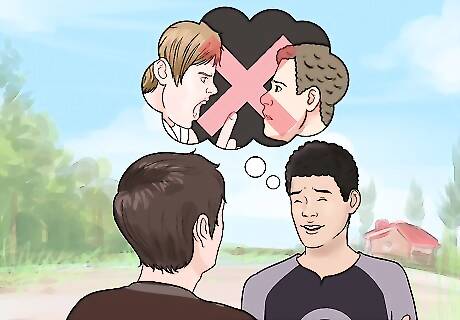
Manage your thoughts about your social interactions. Studies show that how you think about yourself in relation to others has an impact on your level of loneliness.Fear of rejection can discourage social activity and increase feelings of loneliness. If you are thinking you are inferior, this may lead to worrying about social interactions. Remind yourself that we are each different but equal. You are worthy. Expect positive outcomes instead of negative ones when interacting with others. Think of alternative ways that the situation might pan out. For example, perhaps the person will like you! It may not always turn out as badly as you think it will.
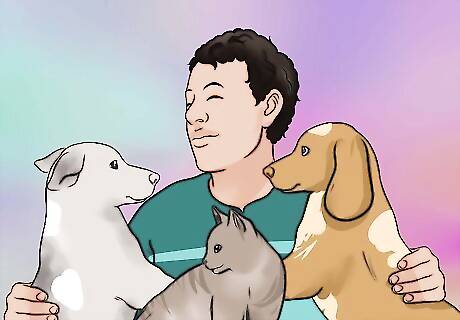
Surround yourself with animals. Animals are the next best thing to humans. There is a reason some therapeutic treatments involve therapy dogs or nature-related activities. Research suggests that being in nature or around animals can give you sense of calm and reduce loneliness. Get a dog, cat, or any other pet (fish, hamster, etc). However, don't overload yourself with too many pets that are difficult to manage. Make sure you identify first what you are prepared to take care of (a fish vs. a dog can be a big difference). If you've never owned a pet before, start small. If you cannot get a pet, go to the pet store and spend some time with the animals. You could also visit a zoo, or offer to watch a friend’s pet for the weekend.

Read. When alone, reading can give you a sense of social connection and help combat loneliness. You can connect with the author or characters in the book. Reading can also transport you to another place and distract you momentarily from feeling lonely. Read as much as possible, because reading not only calms you but also helps keep your mind fresh and active. Pick a novel that you can read for pleasure. Choose a genre that you enjoy such as adventure, fantasy, or sci-fi. You can even read a magazine. Many books are available online as well.
Increasing Social Connection
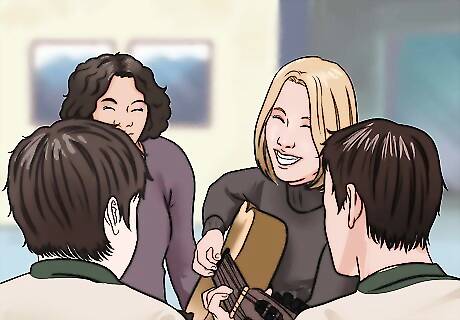
Develop healthy relationships. Individuals who have satisfying interpersonal relationships and friendships show reduced depression, a more positive outlook, and a better ability to deal with challenging situations and feelings overall. Social support can help reduce stress that is associated with feeling lonely. Going to therapy and going to family therapy are good ways to work on your relationships. Focus on engaging in social activities that can lead to friendships. Keep away from cynical and negative people if they bring you down. Ask for help when you need it.

Have realistic expectations when you socialize. Rejection can be more of a worry when you feel lonely. Try not to put pressure on yourself to make a new best friend or a fantastic conversation with each social interaction. Instead, try to enjoy the feeling of connecting in the moment. Social networking allows you to connect without having to worry too much about rejection. Try leaving a comment on someone's post, or sending someone a short message. When you're socializing in person, whether with someone you know or a stranger, try making small talk. You can start with the friendly question, "How is your day going?". Asking someone how their day is going may not seem like the start of a profound conversation, but it allows you to make a small connection with anyone you meet. If it leads to a deeper conversation, that's fine; if not, you've still shared a moment with another person.
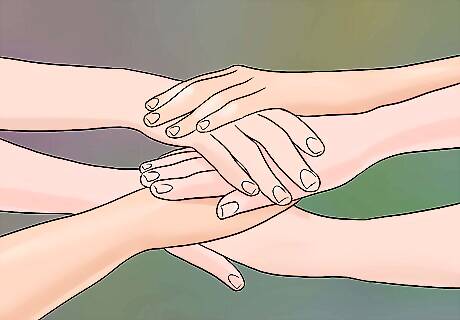
Be open to meeting new people. Signing up for a dating website, joining a group or club, volunteering, or taking a class are just a few ways to put yourself in situations where you'll meet new people who share common interests. If you are interested in and connect with someone, a great way to follow up is by adding him or her on a social networking site (Facebook, Instagram, Twitter). Remember that the relationships you form may not grow deeper right away, and that's OK. For now, focus on how it feels to connect with people in the moment.

Be proud when you make progress. It can be tough to get out there and socialize. Each time you make a connection, whether it's making small talk with a stranger or asking someone in your class out for coffee, be proud of yourself for reaching out. Feeling positive about your social achievements will help you continue making an effort to connect with people. As your social needs are increasingly met, you'll begin to feel less lonely.
Preventing Depression from Loneliness

Engage in positive activities. Doing positive activities may help reduce the risk of depression, and it's an effective strategy for regulating emotions. Research shows that focusing on positive activities can shift attention away from distressing thoughts. On the other hand, focusing on something negative can cause increased distress. Go for a light walk in the park or some calming place. Watch a funny movie. Laughter really can be the best medicine; laughter has been shown to increase overall health and happiness. Social support is a crucial component of preventing depression. If you can, try to spend time with or talk to others in order to prevent depression. Call up a friend, coworker, or family member.

Use mindfulness. If you have been depressed previously due to loneliness, mindfulness can help reduce the likelihood that you will get depressed again. Mindfulness has also been shown to help individuals who feel lonely. Mindfulness is about giving your full attention to what you are currently doing and experiencing. Often we are distracted from the present moment by thoughts about the past (regrets) or future (worry about what might happen). Practice mindfulness as often as you can, especially when you start to become lonely or depressed. Try a mindfulness walk. Simply take a walk down the street and focus solely on your walk. Notice the sounds you hear, the things you see, the smells, and how you feel. Is it hot or cold out? Is there a breeze or is the air still? Do you see any birds in the sky? Is it cloudy or sunny out? Another mindfulness exercise is mindfulness-based meditation and guided imagery. Close your eyes and imagine you are in a safe place. This can be a beach, your bedroom, or sitting under your favorite tree at a local park. Imagine that you are there. Experience your safe place in its entirety including what it feels like (i.e. the sand beneath your toes), smells like (salty air, fish), looks like (notice the whole environment), tastes like (if you eat something or drink something), as well as what you hear (the waves crashing). When you have spent sufficient time in your safe space and feel relaxed you can open your eyes. You can practice mindfulness easily at home, by paying close attention to whatever you are currently doing. For example, if you are washing the dishes - focus your attention solely on this experience. Notice how it feels on your hands, the temperature of the water, as well as what you see. Often our minds will wander when we do these types of mundane activities. Observe any thoughts that come into your mind, and without judgment, let them pass. Accept your thoughts and then re-direct your attention back to what you are doing. You can research and find many more mindfulness exercises by conducting a quick google search.
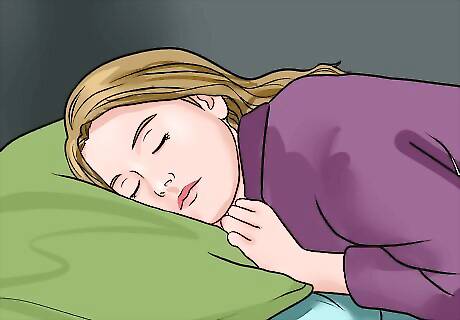
Take care of your health. Depression poses a significant health risk because it can negatively affect medical afflictions. Overall health is positively related to mental health and well-being. Health issues can also contribute to feelings of depression. In order to effectively prevent depression due to loneliness, you will need to focus on maintaining your physical health. Improving your nutrition by eating healthier can help prevent and decrease mental health problems. Your body needs proper nutrients to function optimally. Ditch the junk food and focus on eating plenty of proteins, complex carbohydrates, fruits, and vegetables. Make sure you get adequate rest. This means at least 8 hours of sleep per night. Maintain a sleep schedule by going to bed at the same time each night and waking up at the same time each morning (even on weekends). Exercise regularly. Aerobic exercise has been linked to reductions in depression. Walk, run, hike, do anything that gets you moving. If you have any current medical conditions (especially those that affect depression) make sure you have regular visits to your doctor.
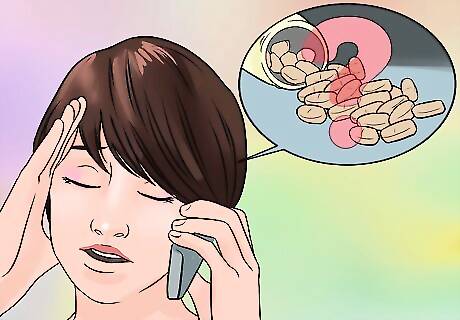
Consider getting treatment. If you think you are already doing all that you can and still feel lonely, or your loneliness is growing into depression, it may be wise to seek expert help. Therapists and psychologists can assist you in developing a clinical and research-based plan to reduce your depression or loneliness. Therapies such as Cognitive-Behavioral Therapy and Interpersonal Therapy have been shown to reduce and prevent repeated depression. Contact your medical insurance provider to inquire about obtaining therapeutic services such as therapy or psychotropic medication (antidepressants, etc). If you lack medical insurance, you can conduct a local search of low-cost mental health services. Many government agencies also provide low-cost health insurance. Psychiatrists can prescribe you medication if you are open to that. Ask your primary care doctor or therapist for a referral.




















Comments
0 comment